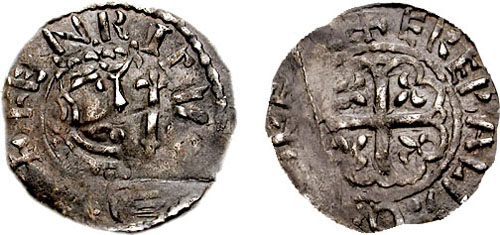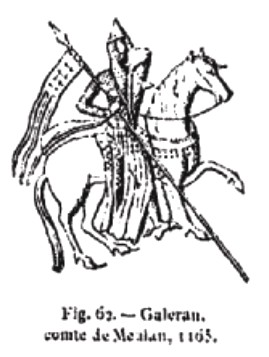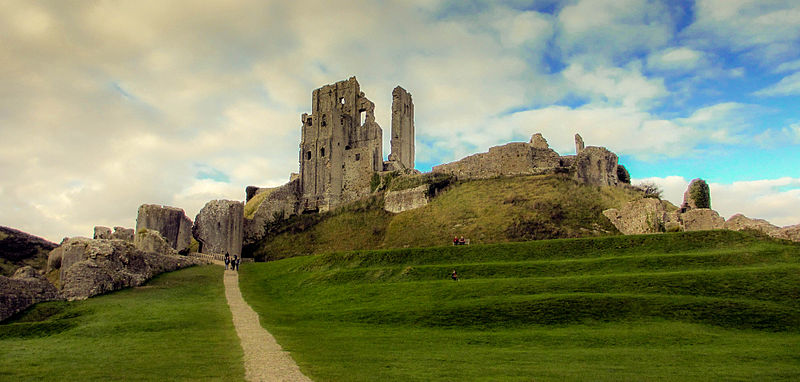 |
| Geoffrey of Anjou |
Matilda at a Loss
Matilda was
in an ambiguous position vis-à-vis Stephen; she had not been present at her
father’s death bed, she had not made an attempt to reach England, nor had she
been crowned. And Matilda’s husband was a man deeply distrusted by the English
barons, who was engaged in leading raiding parties into Normandy. Orderic Vitalis noted that;
‘[Geoffrey’s forces] made
themselves hated forever by their brutality’[i]
even as the
Norman barons began fighting amongst themselves. As soon as they heard of
Henry’s death;
‘They rushed out hungrily
like ravening wolves to plunder and ravage mercilessly.’[ii]
More telling
was the undeniable fact that Matilda was a woman, ten years younger than
Stephen and less skilled at the political games needed to balance the needs of
kingdom and duchy.
Moreover
Matilda was a virtual unknown while Stephen had been a habitué of his uncle’s
court for decades and was a proven soldier as well as Count of Boulogne and Mortain. Once crowned Stephen raised an army of mercenaries to fight against
King David who’d overrun the borders, persuading him to come to terms. This
success rallied the English barons behind their new king. Matilda’s
half-brother Robert of Gloucester[iii] bent his knee to his
cousin rather than his sister.
Lining up for a Civil War
.jpg/644px-Rougemont_Castle_gatehouse%2C_2010_(cropped).jpg) |
| Exeter Castle |
In the
summer of 1136 one Baldwin de Revières, who had been a devoted supporter of
Henry’s, refused to recognise Stephen as his king and fortified Exeter castle[iv] against him. Stephen raced with his
army to besiege the castle. When the well ran dry and the wine ran out Baldwin
pleaded for mercy.
Henry of
Blois argued that an example should be made of Baldwin and his men while Robert
of Gloucester and others took the opposite position. Stephen lacked his uncle’s
ruthlessness and allowed the garrison to go free. The moral was noted; opposing
Stephen was not necessarily fatal.
Eight months
later Stephen turned his attention to Normandy where the ravening wolves were
still roaming the duchy. His army turned its attention to Argentan where Matilda
still lay at bay, but en route quarrelling amongst the nobility saw it fall
apart. Robert of Gloucester accused Stephen of attempting to ambush and kill
him and withdrew to his powerbase around Caen and Bayeux.
 |
| Bayeux |
Stephen, after a lacklustre
campaign which left the Norman barons still fighting amongst themselves,
returned to England.
In June 1138
Robert of Gloucester declared for his sister, publicly renouncing his
allegiance to Stephen. His forces were opposed in Normandy by Count Waleran of Meulan while Stephen rushed to seize Gloucester’s English
territories. His attempt to take Wallingford castle failed and Robert’s man Miles of Gloucester[v] proved an able substitute for his
lord. Stephen failed in his attempt to besiege Robert’s stronghold at Bristol. William of Malmesbury wrote;
‘So the whole district
around Gloucester far
into Wales, partly through force and partly from good will, gradually went over
to the lady empress.’[vi]
The news was
better from the border where David once again brought his army down to the
Scottish-English borderlands. He was opposed by an army of Yorkshire men who
routed the Scots in a two hour battle.
The Fight in Rome
Early in
1139 both sides made attempts to embroil the Vatican on their side and receive
official moral support against their deadly foe. Stephen sent Archbishop Theobald, newly appointed[vii], at the head of a large
embassy of clerics to the Second Lateran Council. Pope Innocent gave him the pallium when Theobald arrived. Matilda sent Bishop Ulger of Angers over the Alps in April.
Unfortunately
for her Ulger was no match for Theobald and the assembled ranks of English
clergy. Ulger, described as a ‘lily among
thorns’, presented Matilda’s case to the council but Ulger was no advocate and
he was trounced by Stephen’s defender Arnulf[viii], Archdeacon of Sées. He claimed that Matilda was not her
father’s legitimate heir as her mother Enid had been a nun before her marriage
which was therefore invalid. This was a specious argument as Enid had never
taken vows and Archbishop Anselm[ix] had decreed that Enid was free to
marry Henry. It did not help that Ulger lost his temper and said to Arnulf;
‘I would marvel at the
shamelessness of your lies were it not that your whole race is garrulous and
deserves to be held up as an example of sinful life and skill and effrontery in
lying. In these arts you are conspicuous among the Normans.’[x]
Innocent
backed the incumbent, accepting Stephen’s gifts along with his claims. Innocent
himself had only just returned to Rome after the death of the Antipope Anticletus II. Matilda protested that Innocent had
been bribed but it was too little too late.
A Cardinal Error?
 |
| Coins minted during the reign of Henry of Scotland |
Stephen now
consolidated his position; one of David’s sons, Henry of Scotland came down to Stephen’s court where his bribe was Ada de Warenne[xi]. By 24th June 1139 the
court was at Oxford where an
affair took place that became known as the ‘arrest of the bishops’.
Roger of
Salisbury and his two nephews Alexander, Bishop of Lincoln and Nigel Bishop of Ely, holders of a number of important castles throughout the
kingdom and suspected supporters of Matilda, were arrested after failing to
surrender their castles in surety for their retainers brawl with the men of Earl Alan of Richmond.
‘The king, eagerly seizing
the opportunity, ordered the bishops to….make satisfaction to his court, as
their people had infringed his peace: that this satisfaction should be, the
delivery of the keys of their castles, as pledges of their fidelity. Though prepared
to make compensation, they hesitated at the surrender of their fortresses; and
in consequence, lest they should depart, he ordered them into close
confinement.’[xii]
 |
| Waleran de Meulan |
All their
castles were seized and the bishops released. The coup against Roger and his
family was spearheaded by the Beaumont twins, Waleran de Meulan and his brother
Robert. Their influence with Stephen was
edging out that of his brother, Henry of Blois.
Stephen may
have taken action against Roger in light of the rumours of an impending
invasion by Robert of Gloucester and his half-sister. But his actions were to
have serious consequences as they destroyed confidence in Stephen’s promise to
respect the liberties of the church, alienating many of the clergy including Henry
of Blois who found the affair ‘outrageous’[xiii].
Not only that but the arrests of Roger, Nigel and Alexander in one foul swoop
removed the realm’s three most experienced administrators.
From now on
the administration was to muddle on, rather than react swiftly and smoothly to
events. Stephen placed running the counties under the military control of
counts or earls with their own feudal vassals. Within the next two years twenty
earls were created from the noble families. Local rivalries were deepened and
family feuds intensified while royal authority was dismembered and
destabilised.
The Incursion
On 29th
August Henry of Blois summonsed Stephen to appear before an ecclesiastical
council for having ridden roughshod over church liberties. The council broke up
after three days, unable to come to an agreement, but it was an indicator of
things to come. Stephen was losing a lot of the support he had garnered at the
beginning of his reign.
Nearly a
month later on 30th September Matilda was to set foot on English
soil for the first time in eight years. She landed at Arundel[xiv] to take shelter in the castle held by her stepmother Adeliza’s new husband William d’Aubigny. Along with Matilda came Robert of
Gloucester and a group of armed men who rode off the 120 miles to Robert’s
castle of Bristol.
 |
| Corfe Castle |
Stephen who
was investing Corfe Castle[xv], ninety miles away in Dorset, immediately marched east to invest Arundel. To avoid the appearance of
making war on two female members of the royal family, one of whom was his aunt
by marriage and had welcomed Stephen at court, and the possibility of a long
siege Stephen took his brother’s advice and agreed to release Matilda into her
brother’s care.
‘The ex-queen was awed by
the king’s majesty, and….solemnly swore that no enemy of the king had come to
England through her doing, but that, saving her dignity, she had provided
hospitality to those in authority known to her.’[xvi]
Matilda was
sent off to Bristol with an escort that included Henry of Blois, closely
followed by Stephen’s army, ready to besiege the castle as soon as Matilda was
safely inside.
Bibliography
The Feudal
Kingdom of England 1042-1216 – Frank Barlow, Pearson Education Ltd 1999
Stephen and
Matilda – Jim Bradbury, The History Press 2005
She Wolves –
Helen Castor, Faber and Faber 2010
Early
Medieval England – MT Clanchy, Folio Society 1997
The
Plantagenets – Dan Jones, William Collins 2013
King Stephen
– Edmund King, Yale University Press 2010
Doomsday to
Magna Carta – AL Poole, Oxford University Press 1987
At the Edge
of the World – Simon Schama, BBC 2002
Early
Medieval England – Christopher Tyerman, Stackpole Books 1996
Henry II –
WL Warren, Yale University Press 2000
[i]
She-Wolves - Castor
[ii]
Ibid
[iii]
One of the greatest noblemen in the country who feared supporting Matilda would
leave him dangerously isolated
[iv]
Castle Rougemont
[vi]
Stephen and Matilda - Bradbury
[vii]
An obscure cleric whose qualifications appeared to be his close acquaintance
with the Beaumont twins. Stephen’s brother Henry of Winchester had expected to
be given the Archbishopric himself
[ix]
Canonised in 1163
[x]
King Stephen - Bradbury
[xiii]
Since the appointment of Theobald as Archbishop of Canterbury Henry had been
working to have himself appointed Papal Legate
[xv]
Held by Baldwin de Revières
[xvi]
King Stephen - Bradbury
No comments:
Post a Comment
Note: only a member of this blog may post a comment.